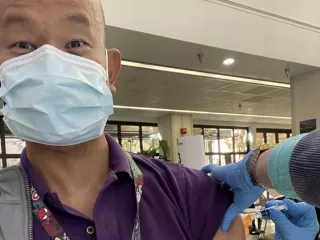This content originates from Baxter International Inc. prior to the company establishing its chronic kidney care and acute therapies businesses into one standalone company, Vantive. This content might contain references to products/brands/persons/services that are not applicable or relevant at the present time. Please contact us in case of any questions.
Our most vulnerable kidney patients during COVID-19

Ken Sutha, M.D., Ph.D., is a pediatric nephrologist at Stanford Children's Health, Palo Alto, Calif. As a kidney patient and a physician, he understands the challenges COVID-19 presents.
COVID-19 continues to put kidney patients at risk, as they have immune dysfunction and often comorbidities. Studies during the first wave of the virus show dialysis patients receiving their treatments in-center were 3-4 times more likely to contract COVID-19, versus those who performed dialysis in their home. Those who contracted COVID-19 also often had more severe outcomes.
For patients with late-stage kidney failure, access to the COVID-19 vaccine has improved their care and lifestyle options. However, not all kidney patients are eligible for the vaccine and, even when vaccinated, having immune dysfunction means their body’s response may be less protective against COVID-19.

Because of immunosuppression, many kidney patients may not develop full protection after vaccination compared to a healthy person. This is most profound in transplant patients but also found in dialysis patients.
Dr. Ken Sutha
Pediatric Nephrologist at Stanford Children's Health, Palo Alto, Calif.
Another important protective measure is for people in contact with children who are vulnerable to get vaccinated to reduce the chance of spreading infections.
Dr. Ken Sutha
Pediatric Nephrologist at Stanford Children's Health, Palo Alto, Calif.
